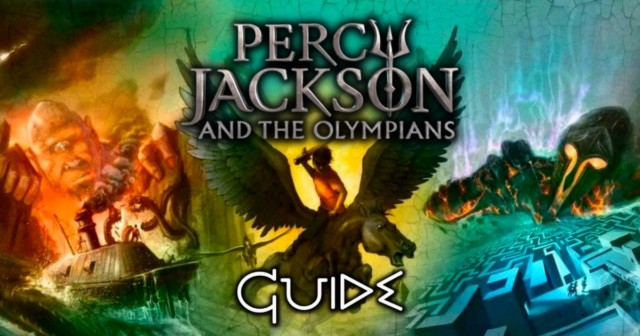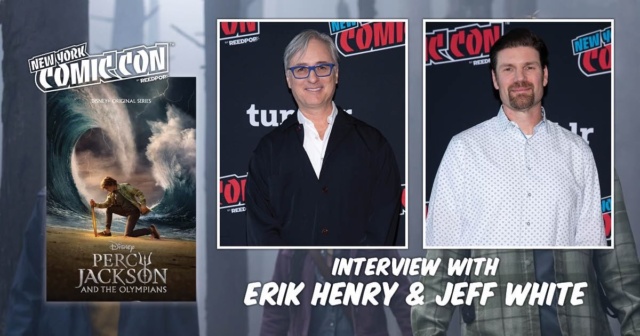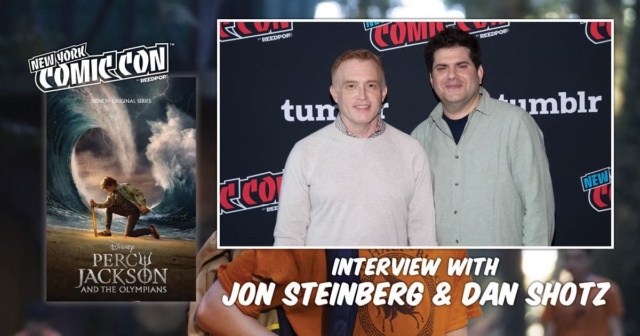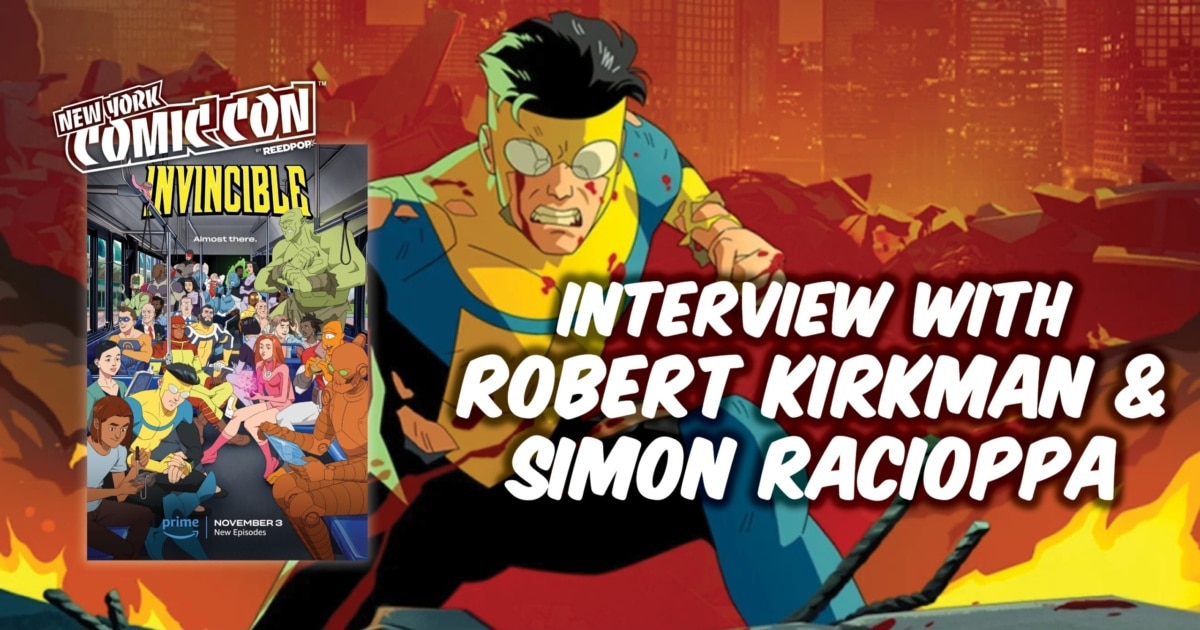NYCC Interview: ‘Percy Jackson and the Olympians’ Director James Bobin
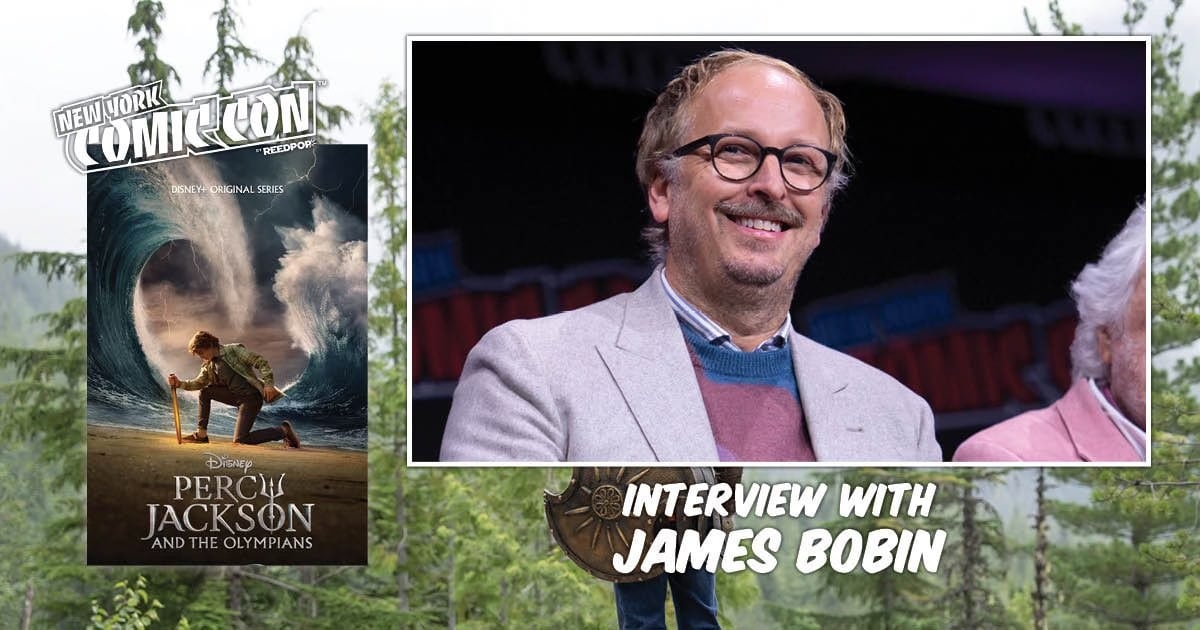
Based on the enthusiastic response at New York Comic Con earlier this month, it’s clear that fans of the Percy Jackson and the Olympians books are ready for an epic adventure. The upcoming Disney+ series, based on Rick Riordan’s beloved books, premieres in December, and fans eagerly await its arrival.
After the exciting NYCC panel that featured sneak peeks of the series (hello, capture the flag scene!), we sat down for a roundtable interview with director James Bobin, who directed the first two episodes. Bobin is not a stranger to working with Disney – he helped bring both The Muppets and The Mysterious Benedict Society to screen.
In our NYCC roundtable interview, we chatted with director James Bobin about bringing the beloved Percy Jackson books to life on screen. We discussed the challenges and rewards of adapting such a beloved series, as well as Bobin’s historian background, his affinity for Greek mythology, and his collaboration with writers Dan Shotz and Jon Steinberg. Bobin also shared insights into working with a young cast and directing on The Volume, the virtual production stage.
The interview with James Bobin about Percy Jackson and the Olympians season 1
[Editor’s note: This interview has been lightly edited for clarity. You can check out the video of the full interview on YouTube or check it out below! There are spoilers for Percy Jackson and the Olympians ahead.]
Interviewer: “So James, we know that the movie is not actually a fan favorite, and by the seven-minute clip that we just saw, the show has a lot of potential to be, actually. And I really want to know, you as a director, what kind of details did you have to pay attention to, to get a result like that? I know it’s a lot, but can you just-”
James Bobin: “It’s a lot, how long you got?”
Interviewer: “… talk a little bit about that please?”
James Bobin: “Because as a director you’re responsible for everything. So you’ve got to find the cast, you’ve got to tone it, you’ve got to design it, you’ve got to build it. I think for me, I’ve been doing a lot of books recently. The last year I did was called The Mysterious Benedict Society, also a book. And that, I think, is partly because I like taking a page and then reading in my head and then putting that idea into the world. And this is the same with Percy Jackson. Percy Jackson, I’ve known for 10, 15 years. And so I knew if I were to make the world of Percy Jackson, what it would look like. And I think the first thing you do is work out what that world is because the most important thing about the show is you believe the world.
But there’s a world in which Percy’s mom can say to him, your dad is a God, and that feels okay. That is quite a hard thing to set up, tonally. Because you have to look back to films like ET. So Spielberg does a brilliant job of grounding the emotion, the reality, but there’s an alien in it and you totally believe that alien is real and that’s a real thing. And we have a similar challenge here whereby, we have a whole world of Greek gods and monsters, which runs alongside our normal world of school problems and bullies and friendships and stuff. And so for me, the world had to be something whereby that sentence about your dad is a God felt possible. And that was the biggest challenge to begin with. Once we got that right, everything else kind of falls into place.”
On the biggest challenge in bringing Percy Jackson to life
Interviewer: “So wondering what was for you the biggest challenge to kind of bringing the world Percy Jackson to life?”
James Bobin: “Well, it’s slightly to do with the responsibility that everyone knows it and therefore everyone has their own opinion of what it should look like. It was great having Rick [Riordan] around because he obviously created it. And so I felt very pleased when he liked what we were doing. And one of the greatest things is when he sent me, he watched the first cut and he really liked it and he sent me a lovely email about it and that was very satisfying because it’s his world and it’s his thing, it’s been his for a long time. And so to see it come to life in a way he liked, which is very satisfying.”
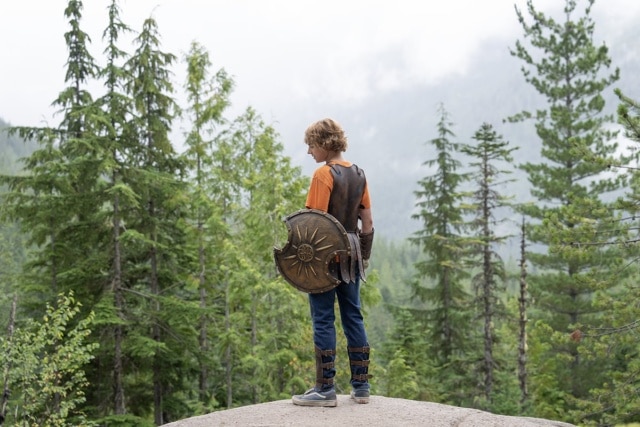
James Bobin: “Challenges wise, yeah, world building, world building is always a challenge. Casting is hard. We got lucky because Walker [Scobell] is incredible, and Aryan [Simhadri] is incredible and Leah [Jeffries] is incredible. But yeah, it was that. It was the idea that people kind of know this world really well and so you feel a responsibility to get it right. And that’s not easy. But at the same time, I was confident I knew what I’d like it to look like. The scripts were fantastic. That’s always a good start. They felt like they were the books or extensions of the books. Obviously, naturally, my two were both written by Rick [Riordan] and Jon [Steinberg], so that’s great, that’s very helpful. But that carries on through the season, you’ll see that does carry on, tonally. So it’s the challenge of the world and the tone, both the two hardest parts.”
On working with a young cast including Scobell, Simhadri, and Jeffries
Interviewer: “What are some of the challenges of working with such a young cast? And what’s the best thing about working with such a young cast.”
James Bobin: “Well, the best thing is also the worst thing, which is basically they’re not adults. So they don’t have the attention span of adults and they just muck around all the time and they just, but that’s good because that brings energy. The other part of it is, we work long days. There are certain rules working with kids, you can’t work that many days, many hours rather, but you do and you work up to the last minute you possibly can. So it’s physically quite demanding I think for kids. So you have to maintain a sense of fun onset. It has to be a fun place to be.”
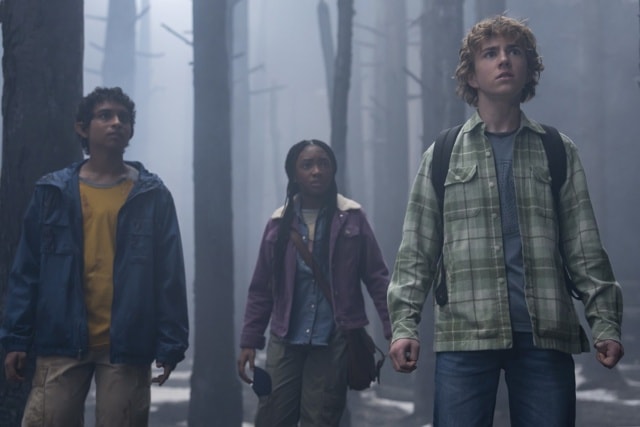
James Bobin: “Luckily they’re great friends, as well as good actors, and that developed throughout the entire season. They were close and they remain close and they hang out together. And it’s in a real way, they hang out on weekends, which is fantastic. But at the same time, important part is they’re like kids unless they eat, they flag, they get a bit tired. And then you have to remember, we’re still filming this incredibly intense scene and you’ve got to get your energy levels up. And so we often do jumping jacks running around things, exercise, wakes your brain up. And so we did a lot of that and that was always quite fun.”
“But I deal with actors of that age as I do with every actor. It doesn’t really matter to me because they take directions as well as anyone else does. They listen very well. You just have to remember that they are 12 or 13, and so sometimes you have to be clear in your instructions. But other than that, there’s no real difference. They are excellent actors and that is when you cast people in casting and we did these kind of testing situations, sort of chemistry reads basically, you look for that, you look for them listening to you. Listening is really important, most people often don’t listen. And in an actor, the most important thing I think often in scene work is when they’re not talking, what are they doing? And often kids don’t listen. And you go, no, no, I know you’re thinking about your next line. Don’t do that. Just listen to the person talking to you. And if I see that, I know it’s always a good sign.”
On the capture the flag scene in Percy Jackson and the Olympians
Ayla Ruby: “Now we saw this cool capture the flag scene.”
James Bobin: “Yes. Episode two. Yes.”
Ayla Ruby: “Which is very important in the books. Can you talk about what directing that is like, because there’s many moving parts?”
James Bobin: “Yeah, it’s a big one. I mean also it was a huge number of extras. That whole scene has, on both sides, are like 60 kids. And so that’s a lot of people in a lot… Like anything in life, when you have a lot of extras, things get complicated and you do those big shots first to get them out of the way and you kind of pass it down to the smaller moments. But because it really, capture the flag is really this side and Percy’s interaction with Clarisse is the main part of that. So that’s what I was focused on, in a way that I think a lot of the show is seen from Percy’s point of view. So I was really keen that the capture the flag sequence, as big as is at the beginning, it essentially becomes what happened to Percy that day. And that’s what it’s. That he goes off because of what Annabeth says and then Clarisse finds him and it becomes a chance whereby Clarisse kind of forces him to be good at sword fighting because he is naturally good at this.”
James Bobin:“And that whole sequence he kind of gets better. You saw it. So by the end, he’s actually really good, which is great. And because obviously he’s just a kid who’s barely held the sword before and he starts off like this, not knowing what to do. So there’s a kind of story in the action. I always think that action needs narrative. Without it, you just don’t care. And so it’s important, there’s a story within the action and that story’s about, this is Percy learning his ability, which is great. And so that’s what that’s about to me. It was a fun thing to shoot. We shot it by the water. You’ll see by the end, the water starts to come in. So we had a slight issue with tides, but it was fine. I looked at the charts for tides a lot these last few weeks of the shoot and making sure we had the right because that tide moves a lot and you’d be very aware of the tide being there or being there.”
James Bobin: “So we had to be kind of careful of that. But by the time we came to shoot, they’d rehearse the stunting many times over. So attached to] the actual physically shooting stuff there weren’t a lot of takes. We just got it right every time. And the choreography worked pretty great straight off the bat because they’d been rehearsing it a lot. And that is the key thing to any choreography of fights, particularly, is rehearse it. So you get it on a day, you haven’t got time to get it wrong on the day normally. No, it’s fun. It was fun though.”
Ayla Ruby: “Thank you.”
James Bobin: “You’re welcome.”
On directing a scene with The Volume
Interviewer: “What’s it like directing a scene using the volume as opposed to…”
James Bobin: “It’s not really different. I mean sometimes it’s complex in terms of… Because the space we were shooting in outside the Met for example is larger than the space we had for the volume, you have to shoot one way and then spin the entire set, and then move to another part of that same area. You can’t, it’s not big enough. So you have to then move around. And doing that, the world has to turn around. So things that were on the stage and now in the background and there are things that were on the stage have to move around. So you have a really good sense of spatial awareness unlike map reading almost. Well thinking about it as a map, 2D map from above, and remembering if that’s gone there and that’s now over there. That stuff is hard because you either got that, you don’t got that and that’s one of those things.”
James Bobin: “So luckily I like maps, so I’m okay, but that was a challenge because that is a difficult thing to do to reorientate the fountain you see them sitting by changing position twice during that scene. Depending on which way you’re shooting, so that got really complicated. That took us a while. But other than that, there’s no difference really because it is really, as ever we’ve filming, about the performance and the coalface. You’re right there with the actors and that’s all it is, that’s the moment you’re trying to get and then technical stuff, hopefully, you worked out prior. And then the acting is just what you get on the day. And so normally there’s no difference. I said I do like the volume, I love being on it in terms of for your mental health because if you are on the blue screen all day, it’s really not… Green screen’s even worse, really bad, blue screen’s quite bad.”
James Bobin: “But when I was in the interior Met for the whole couple of days, we shot that for, it did feel like in the day that I’d been in a museum. It did not feel like I’d been on a stage because it’s so convincing. Even though the volume is only supposed to work for the camera to show it’s on, it does have a sense of presence anyway. It’s naturally just lit and it feels real and a real space. And so at the end of the day you don’t feel like you’ve been on a blue screen with a headache, you feel like you’ve been in a museum. So it’s quite a nice place to spend the day. So for that, it’s very helpful. So it does really work when it works well in those kind of size spaces. Really beautiful.”
On how James Bobin came onto the Percy Jackson project
Interviewer: “I had a question. So we know what the final product looked like. We heard about how it was working on it. How did you get this job? Talk to us about… I mean I think Christopher Columbus did the first film with the first two and he had a pretty promising directorial career. You have a pretty promising directorial career, but did you pitch for this or were you approached?”
James Bobin: “That’s a great question. Yeah, I think I was offered it, they sent it to me. And I’d been doing, I did [The Mysterious] Benedict Society beforehand, I’ve been doing stuff like this and I did movies whereby I like… My last movie was Dora and the Lost City of Gold, which was an adventure movie like Indiana Jones kind of style movie. So I like doing adventure stories and I’ve always wanted to do something like this.”
James Bobin: “And I’ve always loved Greek mythology, I’m a historian, I did a degree in history at university, so I like history. So this is the kind of thing I knew. I knew the history of it. I just use words like Sisyphean and tantalizing, these are Greek words, you know what I mean? So that part of it felt very accessible to me. And as a director you kind need to know what you’re going to do because you spend your entire time answering questions from about a billion people every day.”
“So all you have to do is know what you want to do. And that sounds easy, but it really is not easy. You have to know exactly what you want all the time. And with this, I kind of knew I would because I knew it really well and I liked the world. I knew what I wanted to be and what feel and so, in that case, you can’t help but go, of course, I’ll do this, it’s great. So yeah, they very much, I met Dan [Shotz] and Jon [Steinberg] quite early and that’s also that thing where when you talk to people who the creations of the show and you have the same mindset, you have the same sense of what this could be, the scale of it, the importance of it, how you have to get it right, has to do justice by the source material and all that stuff is really a great conversation whereby you go, okay, we are talking the same language here.”
James Bobin: “That’s really important because you spend a lot of time with these people for the next year or two years, so you’ve got to get it right. So one thing is that you have to be a really good judge of that situation. And generally, I’ve been okay at that. But with this one, I totally thought it from the very outset. I just knew these guys had a great idea, they’re going to do it really well and the books were going to give us incredible source material to do a lot of stuff with, which is exciting.”
James Bobin: “And so that’s why now I’m so pleased to be able to share it with people because we’ve been working on this thing for ages. And so it’s so nice to get it out there. So yeah, it’s great. Today was just fantastic. See people actually react to that stuff. It’s just the best. Really fun.”
Where and when to watch Percy Jackson and the Olympians
Percy Jackson and the Olympians premieres on December 20, 2023, beginning with a double episode on Disney+. If you can’t wait until then, check out Brian Kitson’s companion guide to the world of Percy Jackson.
Guide to the World of Percy Jackson and the Olympians
Are you excited for Disney+’s new Percy Jackson and the Olympians series? Let us know on social media @mycosmiccircus or in The Cosmic Circus Discord!
And if Bobin’s talk about The Mysterious Benedict Society piqued your interest, you can check out our exclusive interviews with some of the creatives behind the show, including costume designer Chrisi Karvonides-Dushenko and production designer Cynthia Charette.
For all our past NYCC coverage, including more interviews coming this week, check out the NYCC tag.
NYCC Interview: Erik Henry and Jeff White Talk Percy Jackson and the Olympians
NYCC Interview: Percy Jackson and the Olympians Showrunners Dan Shotz and Jon Steinberg
NYCC Interview: Robert Kirkman and Simon Racioppa Talk Invincible Season 2

